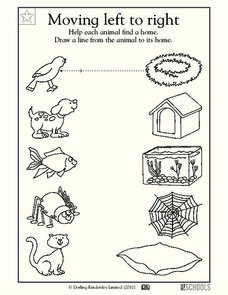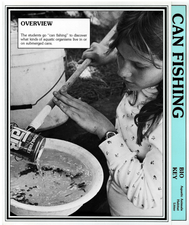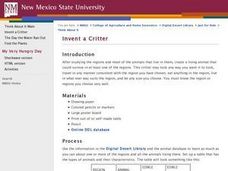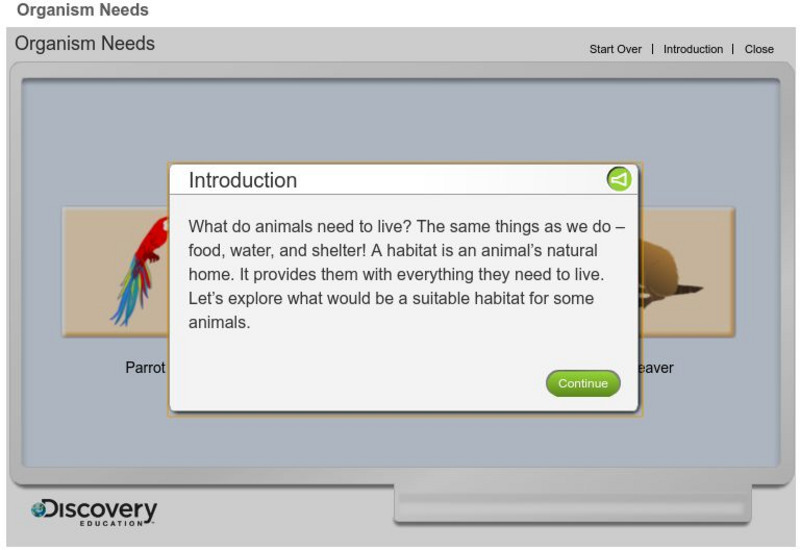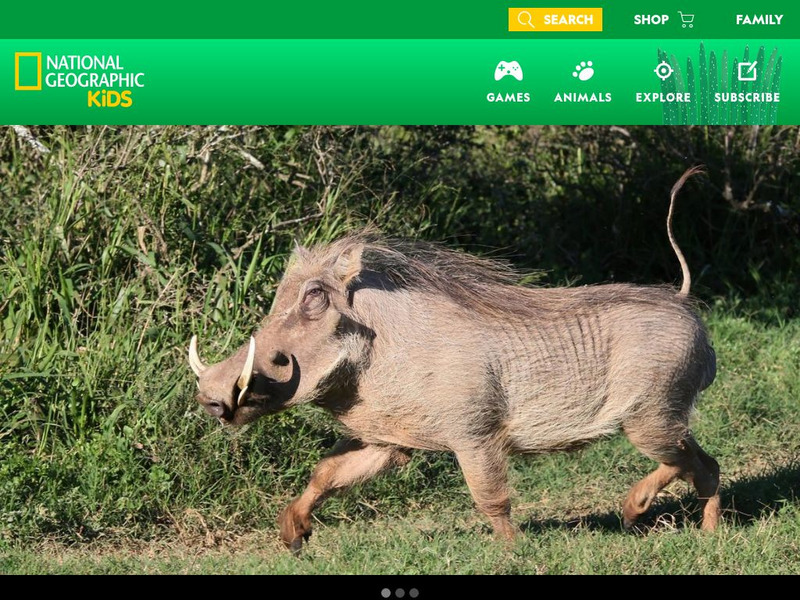Curated OER
Moving Left to Right
These animals need to find their homes! Young scholars help them by drawing lines from each animal on the left to its habitat on the right. There is no guessing to be done here, though; pairs are directly across from one another. They...
Curated OER
Wildlife Burrows
Burrowing animals are busy! Get your middle school ecologists busy as well by having them create a scale model of a burrowing population. They also design a PowerPoint or poster to explain their models.
Curated OER
Animal Habitat Dioramas
What a better way to have learners show what they know than with a diorama? Kids research an animal, its habitat, ecosystem, and environment in order to create a three-dimensional diorama. Have older children write a short paper on their...
Curated OER
Can Fishing
Fifth graders investigate aquatic organisms. In this fishing lesson, 5th graders use can-fishing rigs to observe animals in their natural habitat. Students consider ways to solve a problem and discuss their findings.
Curated OER
Crustacean Critters
Students explore the habitats of hermit crabs. In this crustacean lesson, students discover what animals need to survive. Working with live hermit crabs, students explore how hermit crabs have adapted to their habitats.
Curated OER
Using Math To Make Decisions About Animal Habitat
In this animal habitat instructional activity, students read, analyze and solve 5 scenarios involving mathematics and animal habitats. Students work out each decision they decide as correct and write out a proposal for each one.
Curated OER
A Walk in the Wild
Fifth graders identify characteristics of animals and their habitat. In this animal science lesson, 5th graders read Crinkleroot's Book of Animal Tracking and and Animal Tracks. Students match animal tracks to the correct animal...
Curated OER
Humans Leave Bob Bat Homeless!
In this science worksheet, students read an "interview" with a bat who has been displaced from his home in the rainforest. Using a word bank, students fill in 20 missing words from the script. Students then answer 10 questions about...
Curated OER
Invent a Critter
Students create a living animal that could survive in at least one specific region and use the digital desert library to gather information. In this invent a critter instructional activity, students draw a picture of their animal, ...
Curated OER
Hide and Seek
Students explore animal characteristics by creating a poster presentation in class. In this animal habitat lesson, students visit the local zoo and identify which habitats certain animals are most comfortable in. Students answer study...
Curated OER
Zones of the Rocky Intertidal Zones
Sixth graders predict intertidal zones for organisms. For this intertidal zones lesson, 6th graders analyze an illustration of an organism and a class diagram of the intertidal zones. Students research to locate the zone the organism is...
Curated OER
A Forest Dwellers Quiz
In this forest animals worksheet, students complete a four question multiple choice on-line interactive quiz. Included are questions about: wild boar, roe deer, red fox and red deer.
Curated OER
Animal Habitat Bar Graph
In this graphing worksheet, students examine a prepared bar graph and record which habitat their chosen animal lives in: desert, city, forest, ocean, prairie, or fresh water. There are no directions but it appears that a class could use...
Curated OER
Animals and Habitats of the Chesapeake Bay
Students work in small groups to discover the various habitats present in Chesapeake Bay and the animals that live in them. After investigating the habits and lives of the animals they will draw conclusions about other habitats the...
Curated OER
Variation
In this animal habitat instructional activity, students read the clues about the animal environments. Students then write or draw each of the animals in the right space. Students find the habitats for trout, a bird, a human, and an...
Curated OER
Bird Nest
Second graders create a bird's nest from recyclable material. After a discussion of animal habitats, 2nd graders collect recyclable materials, appropriate for nest building during a nature walk. They use their materials to build a nest...
Discovery Education
Discovery Education: Homework Helper: Organism Needs (Habitats)
An interactive game asks you to identify the habitat needs of certain animals by building a suitable habitat for a parrot, lion, and beaver.
National Geographic Kids
National Geographic Kids: Animals: Warthogs
"Many scientists believe there are two species of warthogs." Learn all about warthogs in this multi-media site. Video and audio clips as well as other web links make this a great site for student research projects.
BBC
Bbc Schools: Ks2 Bitesize: Science: Living Things: Plant and Animal Habitats
Place the aliens in the habitats where they can survive the best. Following the activity, read more about plant and animal habitats, and then take a quick quiz to check for understanding.
Other
Zelda's Zany Zoo
This site leads students through the process of designing a new animal habitat for a local zoo. The students are guided through the entire process, from design to presentation. A rubric is also provided for a self-evaluation of the...
Other
U.s. Forest Service: Discover the Forest: Forest Snapshot Game
Students manipulate a camera to take photographs of animals they observe in three forest scenes.
Read Works
Read Works: Organizing Information Into an Outline
[Free Registration/Login Required] In this activity, young scholars will take notes as they read Animal Homes by Ann O. Squire. This information will then be organized into an outline. Includes printable materials for teacher and students.
Other
St. Johns River Water Management District: Raleigh's Den
Enter the world of the river otter and learn about conservation efforts at Florida's St. Johns River system. Meet Raleigh Otter and learn about his habitat and daily activities. Includes facts about otters and links to coloring pages and...
Environmental Education for Kids
Eek!: Leave Animals in the Wild
Discover what you need to know about what makes an animal wild, including the time and energy it takes to keep a wild animal, well, wild.


